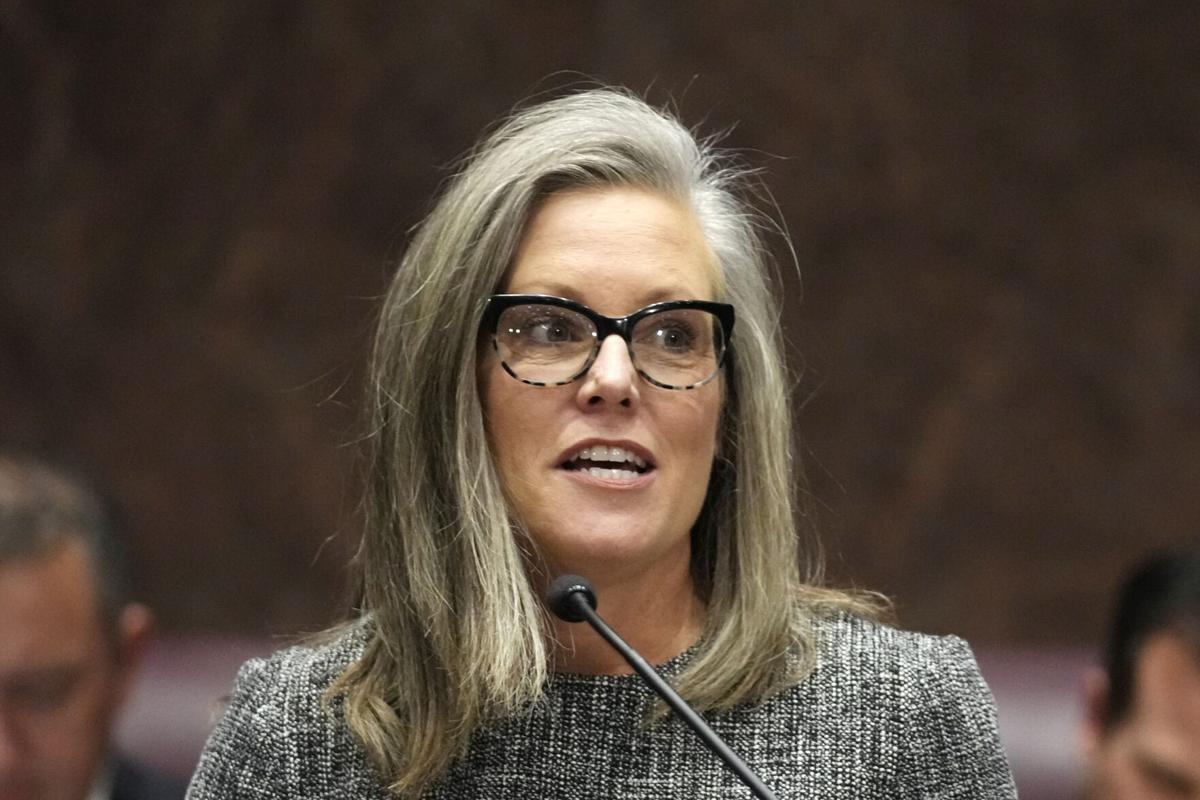PHOENIX — Gov. Katie Hobbs vetoed 11 more bills Tuesday sent to her by the Republican-controlled Legislature, bringing her total to 62 this session and shattering the record set in 2005 by fellow Democrat Janet Napolitano.
The previous record of 58 was over the course of a full legislative session. There are likely weeks to go before the current session comes to a close.
The new vetoes range from precluding certain vaccine requirements to attend public schools; to requiring the attorney general to defend the constitutionality of whatever the Legislature approves; to measures altering election laws; to one declaring the federal government can't impose and collect certain taxes on firearms and ammunition, taxes that do not even exist yet.
The biggest surprise came as Hobbs rejected legislation that would have expanded the kinds of foods prepared in home kitchens that could be sold in Arizona.
House Bill 2509 gained broad bipartisan support, being approved by the House on a 45-11 margin and the Senate giving its OK with just four dissenting votes.
Current law exempts certain kinds of "cottage foods'' from oversight by the Arizona Department of Health Services. These generally fall into the area of baked goods like cookies and cakes that do not need to be either refrigerated or kept warm.
None of that has stopped the sale of tamales and other products by individuals in front of grocery stores and in parking lots. The legislation would have legalized the practice if preparers met certain conditions including that the items be delivered in person and that certain conditions for transporting them are met.
The governor was not convinced.
"This bill would significantly increase the risk of food-borne illness by expanding the ability of cottage food vendors to sell high-risk foods,'' Hobbs wrote.
"It fails to establish sufficient minimum standards for inspection or certification of home-based businesses, and could limit the ability of ADHS to investigate food-borne disease outbreaks,'' she continued. "Nor does it provide a strong enough mechanism to ensure home kitchens are free of hazardous chemicals, rodent or insect infestation, or that equipment and storage of temperature-sensitive foods are adequate, functioning, or even existent.''
Proponents did not see it that way.
"I personally have never been made ill or had food poisoning from something I've bought from cottage food,'' said Rep. Travis Grantham, R-Gilbert, the sponsor of HB 2509. "I have been made ill at a restaurant, ironically.''
And Rep. Alma Hernandez, D-Tucson, said lawmakers should support people selling food items they've created in their homes.
Vaccines and schools
On another measure, Hobbs had a much simpler explanation for her veto Tuesday. HB 2474, sponsored by Rep. Steve Montenegro, R-Goodyear, would have barred the health department from ever requiring students to get immunized against any ailment to attend school if the vaccine has received only "emergency use authorization'' from the U.S. Food and Drug Administration.
That is specifically the category under which the FDA gave approval to vaccines for children against COVID-19.
"Vaccines are vitally important for the health and wellness of our state,'' Hobbs wrote, saying the legislation would "undermine public trust'' in FDA-approved vaccines.
Arizona already has some of the broadest exemptions from vaccine requirements. Aside from allowing people to opt out for medical or religious reasons, the state also allows parents to claim a personal or philosophical objection to certain vaccine mandates, though if there is an outbreak, their children can be forced to stay home from school.
Hotels and the unhoused
Hobbs also nixed HB 2379, which would have spelled out in state law that hotels and motels cannot be required to accept government-issued vouchers to house homeless people.
"Hotels and motels in Arizona have never been required to accept a voucher to house someone, and no proposal to do so is under consideration here,'' the governor said.
Rep. Matt Gress, R-Phoenix, conceded the point when he pushed the legislation. But he said it is happening in Los Angeles and he did not want the practice to spread.
Hobbs was unimpressed.
"Instead, we should focus on the real problem of housing affordability by making sure housing assistance can be used where it's intended, and that tenants do not face discrimination for using a voucher in the rental market,'' the governor said.
That was a swat at former Attorney General Mark Brnovich, a Republican who issued a legal opinion voiding a Tucson city ordinance that landlords could not refuse tenants based on having Section 8 vouchers or other assistance. That opinion was rescinded by current Attorney General Kris Mayes, a Democrat.
Elections
Hobbs had no more interest in signing SB 1565, which would have precluded the use of artificial intelligence anywhere in the election process, including in screening signatures on ballot envelopes to see if they match.
Maricopa County had used AI-assisted scanners in 2020 to see if there were signatures on envelopes, but said all were still checked by humans.
At this point, Hobbs said, the legislation "attempts to solve challenges that do not currently face our state.''
HB 2691 met a similar fate. It would have set out specific chain-of-custody requirements for handling ballots.
"I am eager to work with the Legislature to advance legislation that strengthens our elections,'' Hobbs wrote. "This bill, unfortunately, does not advance that goal.''
Felony warrants
Hobbs also vetoed SB 1262, which would have required a court to promptly issue a warrant for the re-arrest of someone who is charged with a felony while on probation.
"This bill raises due process concerns,'' the governor said.
Earlier this month, Hobbs told Capitol Media Services she was not going to advance legislation that doesn't address the challenges she said the state faces.
"And so I don't think there should be too many surprises in the things I have sent back'' through vetoes, she said then.
Get your morning recap of today's local news and read the full stories here: http://tucne.ws/morning





